#Magic System
Explore tagged Tumblr posts
Text
When I was in my teens, I used to make an entire magic system with 360+ unique spells, ordered in magic schools and categories, and it boggles my mind that I basically reinvented DnD mechanics, even down to metamagic.
I wanted to make a wiki about it but I don't have time for it.

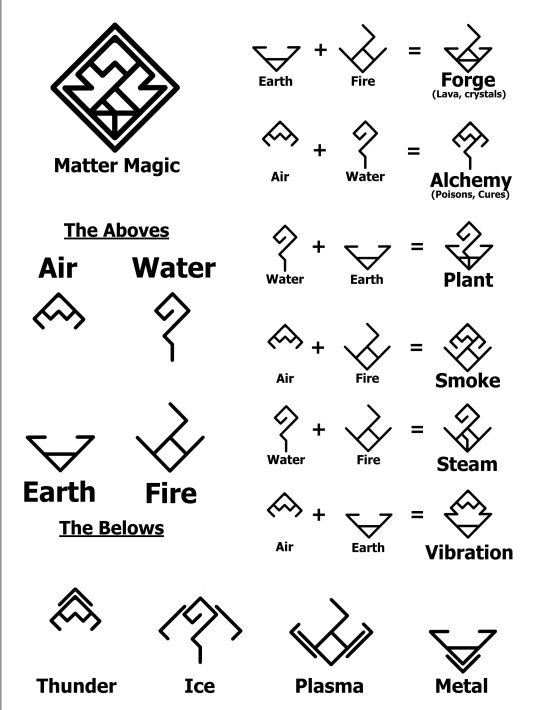
The point was to try to encompass every "superpower" I could think of into a magic system.
I even got lore related to it all, I'm pretty sure I'm gonna simply reuse it all for OC worldbuilding. Ngl the fun part was naming all the spells, symbols and coming up with the logic of it all.
30K notes
·
View notes
Text
There’s a reason I subconsciously made use of magic in my TTRPG make you breath out smoke.
#it’s hot#but bad for health sadly#sigh#ttrpg#making TTRPG#magic system#indie ttrpg#MWH#mystwork heart
50 notes
·
View notes
Text
❗A lot of japping incoming
Ever since changing my MC's magic type, it's been a challenge to create new lore and design.
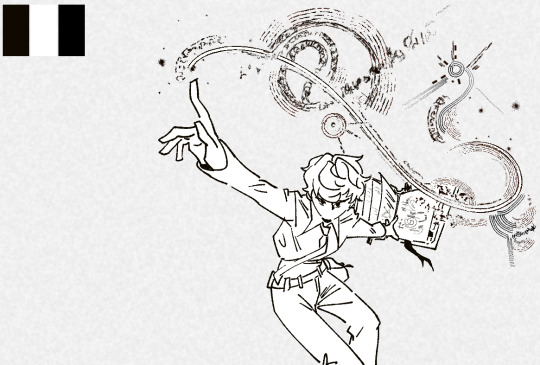
All from fighting styles, visualization, lifestyle, script and creativity - that dances around the concept of a complex yet dangerous (ancient) rune-magic. Supposedly forbidden practice.
As much as I researched or got inspired by other people's works, it felt right to include symmetry into the role, next to runescribing:

And even though I tend to overcomplicate and perfect things - my research asks an important question:
Based on the Magic System (SD) what type of magic is Rune-Magic?
-ф- Hard Magic System
-б- Soft Magic System
-ж- Hybrid Magic System
And lastly: Do I need to make sense of everything. Or is it enough with just doodles from whatever idea I get.
If this invokes interested I could post the research and scripts on a different platform that explains everything in depth.
#sketch#digital art#digital sketch#original character#study#rune#rune magic#ancient runes#concept art#oc#fanart#hpma mc#hp magic awakened#harry potter magic awakened#magic awakened oc#magic awakened#hpma#character design#magic type#mage#wip#idea brainstorming#I've done so much game design concepts that it's practically in my blood to overcomplicate things#system dynamics#magic system
21 notes
·
View notes
Text
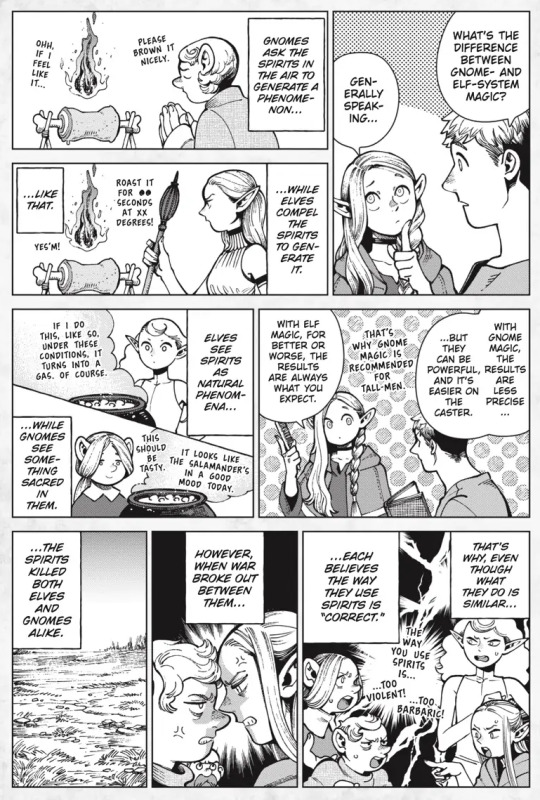
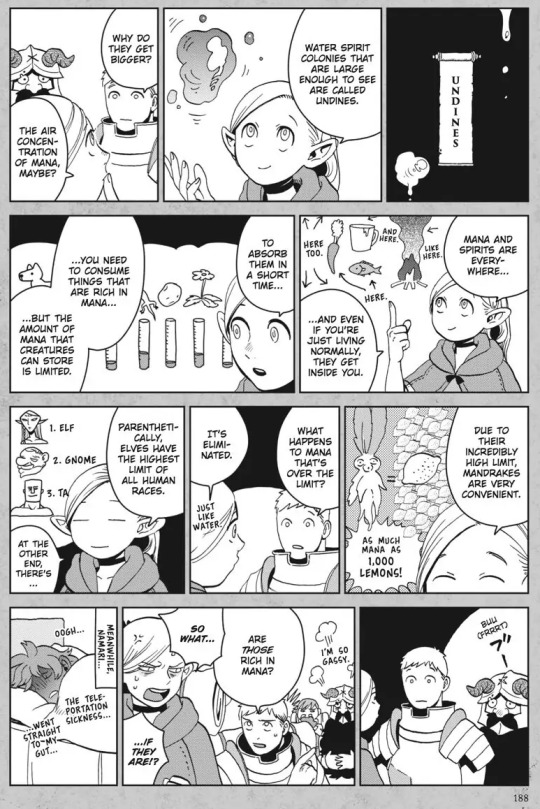
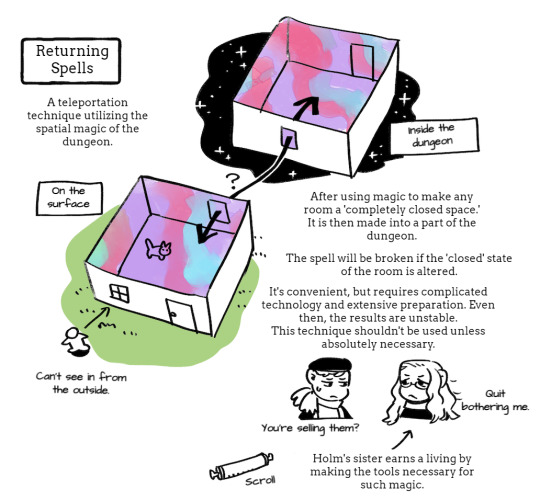
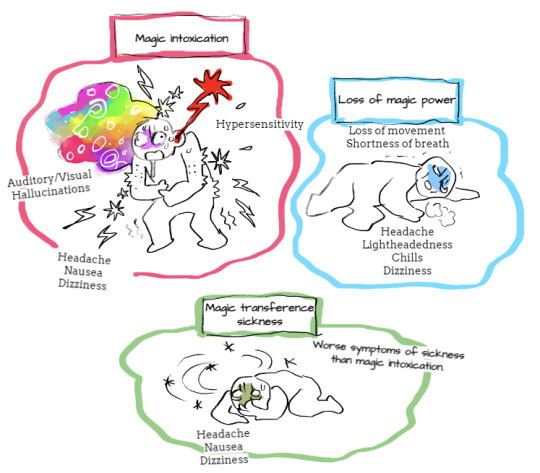
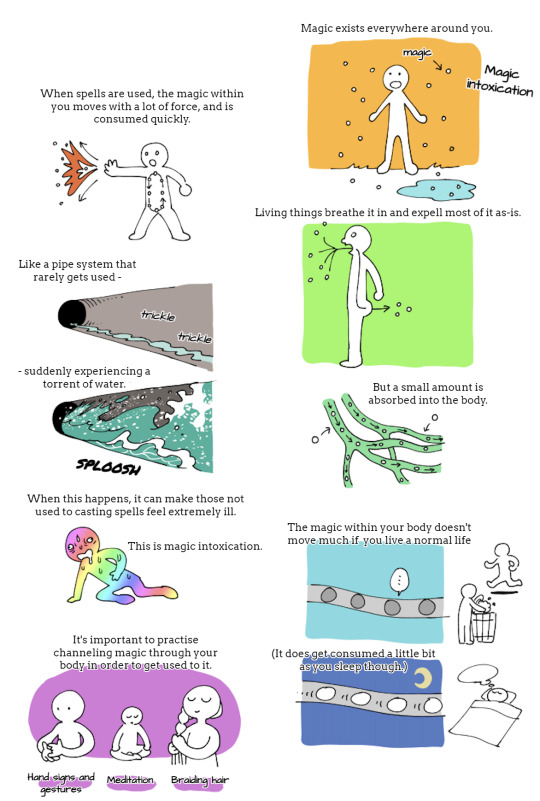
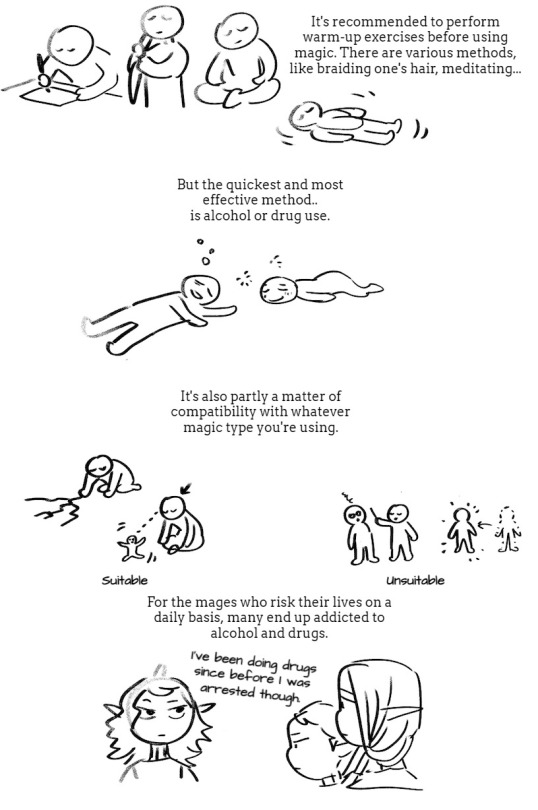
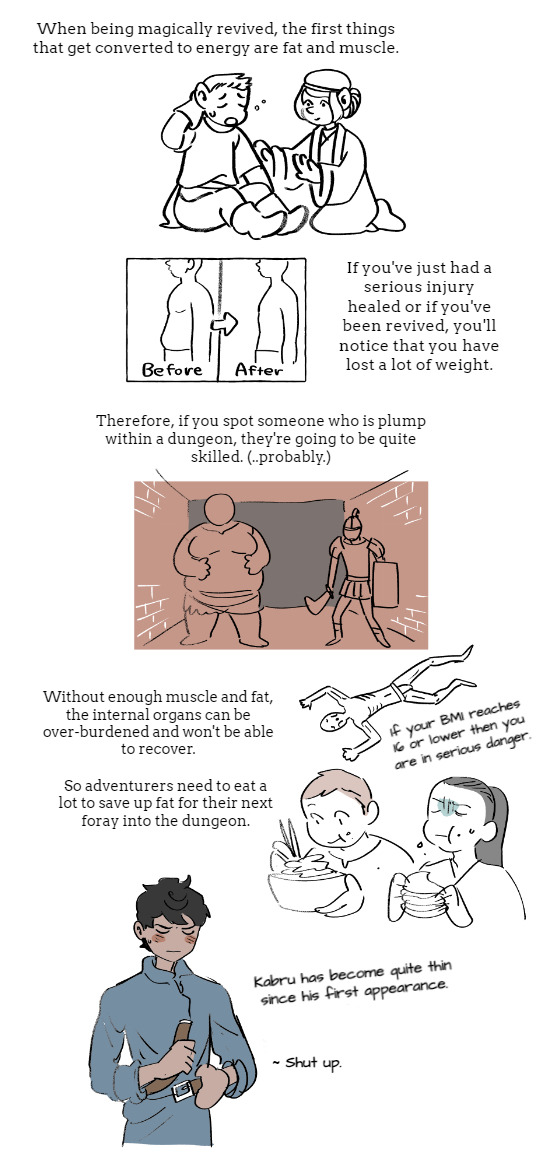
Dungeon Meshi Magic System - Bits about Magic
#dungeon meshi#magic system#for referencing#Compilation#Marcille Donato#Fleki#Kabru of Utaya#Ressurection magic#Mana#returning spell#Theres way more than this but I wanna gather more stuff before making a new post
10K notes
·
View notes
Text
Ways to solve the Why Can’t They Use Magic To Fix Everything problem:
•Magic has a cost. The more powerful the spell, the more it drains the caster’s life.
•’We tried that ages ago.The gods grew angry at our arrogance and stripped most of our powers away.’
•Magic is tied to the stars and planets. Its full potential can only manifest on certain astrological events.(And these are once-in-a-millennia type events)
•Only one will a pure heart and selfless intentions can use their full power.
•All magic users are descendants of a (god/spirit). As the years have gone by, the blood has become more diluted, and magic has grown weaker as a result.
•Spell casters can only cast (finite number of spells). They end up using their gift on trivial matters.
•’After the war, we realized the dangers that magic presented. And so we sealed it away, lest it destroy the world.’
•Everyone has magic. Trying to solve one problem is futile as it can be easily undone(often violently and with much destruction)
•inverse of the above: everyone has magic, but their powers are limited and (mostly) harmless.
•Individual, company, or nation has a monopoly on the only substance that can negate magic. As they rule the world, they have installed anti-magic devices everywhere.
•Individual, group, company, or nation has a monopoly on magic. To insure their grip on power, all magic users that do not submit to them are killed.
•An act of good will spawn one of evil. The use of fire will cause somewhere to grow cold and dark. And to save a life, one must sacrifice another.
•The only magic people have access to is Chaos Magic. No one uses it, for obvious reasons.
—••• •• ——• ——• • ••• —•• •• —•—• —•— ••— •••
#writing#creative writing#writing inspiration#writing problems#writing resources#writer#writers#writers and poets#magic#magic system#writer on tumblr#writeblr
6K notes
·
View notes
Text
I'm bored of elemental giants. Use environmental giants instead.
Environmental Giants all start out the same, but their bodies take up the features of the place they live in. They become a reflection of their domain.
Giant takes up residence in the cliffs of dover? Not a stone giant. No, that's specifically The Giant of Dover. Its body is made of chalk. It can create dust clouds of chalk with its breath, its shoulders are padded with tufts of short grasses and blackberry bushes.
Giant takes up residence in the ruins of a highway during an apocalypse? That's the I-95 Giant. It has rebar spines along its back, skin of pavement and concrete, and wears wrecked cars as armor.
And to make this idea more dynamic, the giant's form changes as the ecosystem changes. A river gets diverted away from a Giant's domain? Then the Giant dries up along with its land. Now the Giant has an incentive to protect its dominion, and a weakness that its enemies can exploit.
#game design#indie rpg#ttrpg#indie games#rpg#rpgs#indie ttrpg#dnd#tabletop rpgs#worldbuilding#writing#magic system
2K notes
·
View notes
Text
Worldbuilding and Magic Systems: Things to Consider
Have a magic system in mind for your fantasy world? Here's a list of things to consider to help you tie this system into the rest of your worldbuilding, so that it feels more believable and realistic.
Source
What is the source of magic? Is it natural or man-made? Can humans use magic or is it a force of nature that only animals or other races can use?
Does magic originate from inside a person or does it require external items to use? If it comes from items, can the items be made? How long does it take to make the items?
Does the magic cost anything- money, stamina, health, etc.?
Can a person be cut off from being able to use magic? If so, how?
Prevalence
How common is magic in your world? Is it so common that everyone has seen it or is it a subject of myths and rumors?
How long have the people in your world known about magic? Has it always been there or is it a new discovery?
How much does the average person know about magic? How much do experts know? What do people not understand about this magic? Are there any common misconceptions? Myths?
Is magic revered or feared? Or if it's common, is it taken for granted? Are there any taboos surrounding magic?
How many types of magic are there? Are some more common than others?
Are there dedicated schools of thought surrounding the study of magic? Is it taught about in schools? If so, is it taught to children or only at the college (or equivalent) level?
Accessibility
Who can use magic? Who can't? Is it something that only the rich and powerful can use? Why? Or do genetics determine who can use it? Wealth?
Are there any physical limitations that might restrict who can use magic? For instance, maybe old or sickly people can't use magic because it requires a lot of physical effort. Does your society provide accommodations for people who can't use magic? Is a lack of magic ability considered a disability?
Does education level determine capacity for magic?
How easy is it to gain access to magic? How easy is it to learn about magic?
Power/Usefulness
How powerful or useful is magic for different parts of society? Military? Medicine? Entertainment? Art? Childcare? Government? Communication? Business?
How does magic affect the politics of your world? How does it shape the economy? Are there feuds over the use of magic? Do powerful groups in your world have an incentive to limit the use and accessibility of magic? Why?
What happens when people no longer have access to magic? Does this cripple their ability to go through their daily lives? How?
Mix, match, and cross-reference these with other elements of your worldbuilding to form a believable magic system that lives and breaths just as the rest of your world does. For every answer you give to the questions above, consider and build upon the implications of what that might mean for your world. A worldbuilder's best skill is the ability to ask "How will this affect ___?" So make sure you're always considering the ripple effects of each element you add to your world.
Happy worldbuilding y'all!
#creative writing#writing#writers on tumblr#writerscommunity#writing advice#writeblr#writing tips#fiction writing#writing help#fantasy worldbuilding#worldbuilding#fantasy writing#fantasy writer#fantasy novel#fantasy#magic#magic system
1K notes
·
View notes
Text
Some Basic Occult Terms You Should Know
If you're a newbie occultist, you might feel a bit thrown off by all of the arcane terminology and magibabble that your books will start throwing at you. Here's a list of all the most important and/or most misued terms, and what they're supposed to mean. (If you're a fantasy writer and you want some authentic occult terms to use for your magic system, this might be useful for you, too!) I have a list of occult fields and divination methods here, so I'll leave them off this list.
Altar: Your working space for ritual. It's called an altar because magic is (usually) an inherently spiritual endeavor — you are communing with grand cosmic forces, of one kind or another. A basic altar consists of your magical tools, candles (for vibes), and images or statues of whatever spirits you're working with. (Spelled altar with an "a," not alter with an "e." An alter is a headmate or a personality in a DID system.)
Athame: A ritual knife, specifically one used in Wicca. It's mostly used for directing energy, rather than for cutting things. (Sometimes, a knife or sickle that is used for cutting things is called a boline.)
Apotropaic: Referring to protection magic. An apotropaic charm is a spell meant to keep bad stuff away. Amulets are apotropaic talismans.
Astral: The spirit world. The astral plane is the literal or figurative "above" in "As above, so below." "Astral" can refer to ethereal or spiritual beings or "energy." Sometimes magic is called "Astral Light," like the Force in Star Wars. Astral projection is traveling through the astral plane during meditation, by sending one's spirit or astral body away from one's physical body.
Besom: A witch's broom, specifically a traditional broom made of twigs tied around a pole. It's just an old term for a broom. (Witchcraft likes to make use of Old and Middle English words.)
Baneful: Describes any kind of spell designed to harm or inhibit another person. Also called malefic (as opposed to benefic) magic.
Banishing: A spell that is designed to force unwanted vibes out of a space. Usually performed at the beginning and end of a ritual, so you can begin with a "blank slate." It's like hitting the magical reset button. Also good for managing negative emotions. The best-known banishing in Western occultism is the Lesser Banishing Ritual of the Pentagram. A banishing can also be a type of baneful working that forces a person's influence out of your life.
Binding: A spell that is designed to prevent a person or entity from acting. A binding spell can prevent a person from harming themself or others, or prevent a spirit from misbehaving.
Charm: A generic term for a spell, especially one represented by a physical object or phrase. A lot of charms are inscriptions or symbols written on paper and kept on one's person.
Conjuring: A spell or ritual that summons a spirit. Invocation and evocation are both types of conjuration.
Correspondences: Magical properties of things existing in nature, e.g. colors, crystals, plants, animals, elements, planets. They were once called occult virtues, and were a staple of Renaissance magic. They're like the building blocks of a spell or ritual, and they can be used as tools to align natural forces with the magician's intent.
Curse: A baneful enchantment, a spell designed to cause harm to another person. There's lots of different types of curses, and lots of reasons to cast one. Sometimes the word hex is used interchangeably.
Demonolatry: The practice of worshipping demons, as opposed to demonology, which is the study of demons or any magical working involving demons. Some magicians prefer to bind and command demons rather than worshipping them, but demonolators treat demons the way pagan witches typically treat gods.
Divination: Acquiring information by magical means. There's thousands of different methods. Some of the more popular ones are cartomancy, reading cards, cleromancy, casting objects like stones or dice, and scrying, staring into a blank object like a mirror or a crystal ball. Astrology is a kind of divination, too.
Ego Death: A particular type of mystical experience, in which one becomes "submerged" in the infinitely vast presence of God or the Universe, and briefly loses one's sense of self. It can be traumatic the first time one experiences it, which is why it's compared to or symbolized by death. Subsequent times are usually much more peaceful and enlightening. A prerequisite for most mystical traditions.
Egregore: An entity created and sustained by a group of people, a collective thoughtform.
Elements: Much of Western esotericism is based around the four classical elements, Earth (🜃), Air (🜁), Fire (🜂), and Water (🜄). They're better understood as the four states of matter: solids (🜃), liquids (🜄), gasses (🜁), and plasma (🜂). Each one is understood as a spiritual force, with its own correspondences and areas of life that it governs. Much of Western magic involves harnessing their influence.
Enchanting: Imbuing an object or place with magic. The magic of the enchantment will last much longer than the duration of the ritual.
Evocation: Calling a spirit to appear before you within a ritual space, a more correct word for summoning. Ideally, a successful evocation will cause the spirit to manifest before you in some way (though you might need a scrying mirror in order to see it).
Familiar: A personal spirit that aids a witch or other magic practitioner. Distinct from a servitor in that it is an external entity that helps the witch of its own accord, not one that the witch themself has created. Traditionally shaped like an animal, but not always. (Lately, the term has become popular as a word for a witch's pet or animal companion. Lots of people use the word "familiar" to refer to pets that aid with magical workings. Traditionally, though, familiars are spirits, not actual animals.)
Fetch: A witch's astral body (or servitor) sent forth to do their bidding.
Glamour: A type of enchantment or illusion spell that changes the appearance of something. In real life, glamour spells won't literally change the physical appearance of a thing, but they will change people's reactions to a thing, e.g. casting a glamour on yourself can cause other people to perceive you as being more attractive.
Grimoire: A book of magic (as opposed to a book about magic). There are lots of mysterious magic books that circulated in Europe in the Middle Ages and early modern period. These books are full of spells, rituals, and weird symbols meant to conjure spirits, gain secret knowledge, and control other people. Modern grimoires are books of practical spells and rituals for experienced practitioners, as opposed to theory or how-to guides. Most occultists also keep a personal grimoire to record their own spells and rituals and their results. (In Wicca, a personal grimoire is called a "Book of Shadows.")
Incantation: Magic words, especially spoken (as opposed to written) spells.
Invocation: Calling a spirit to give you some of its power, either by lending its attention or influence to your magical working, or by physically possessing your body and mind. The latter type of invocation can be partial, meaning you share your body/mind with the spirit, or total, in which the spirit possesses you completely. Don't attempt total invocation alone! Total invocation needs a group ritual, so that other people can tell you what you do and say while possessed, and keep you safe. (Besides, partial invocation is intense enough as it is.)
Left-Hand Path: In Western occultism, the Left-Hand Path is an umbrella term for traditions that take an iconoclastic or self-interested approach to magic. LHPers tend to resent dogma, question taboos, and place emphasis on one's personal power or divinity over unification with the Divine or service to others.
Magic: It's impossible to properly define "magic," with all of its nuances, in a list like this. So I'll give the short version: One famous definition is Aleister Crowley's, "causing change in accordance with Will." This is a pretty broad definition that includes anything done with intention. A more academic definition of magic is "heterodox ritual behavior." Personally, I prefer "harnessing spiritual or supernatural forces to cause desired change in one's life."
Mysticism: The practice of facilitating direct interaction with the Divine, i.e. meeting God face-to-face, in order to acquire spiritual knowledge. Mysticism is taxing and comes with a real risk of insanity, so, it requires a lot of diligent study and mental discipline for most people.
Necromancy: Originally, necromancy referred to a type of divination, which involved calling the spirit of a dead person to ask it questions. (The "Speak With Dead" spell in D&D is a great example of traditional necromancy.) Lately, though, "necromancy" has come to refer to any kind of magic involving the dead. (Be respectful! Dead people are still people.)
Patron Deity: A god or goddess that takes a personal interest in you and your spiritual development. You can't force a god to take interest in you, so you may or may not have a patron deity. If you don't have one, don't worry, you can still do magical work with gods! See this post for the rundown. (Btw, the feminine of "patron" is patroness, not "matron." "Matron" means something different.)
Pentacle: A type of circular talisman inscribed with a sigil representing a spirit or planet, used to evoke its influence. Typically worn as a pendant. Also refers to a pentagram (five-pointed star) in a circle.
Poppet: A doll made of clay or cloth used to represent a person in a spell. In pop culture, poppets ("voodoo dolls") are best known as cursing tools, by being pricked with pins or otherwise harmed in order to harm the person. But there are lots of potential uses for poppets beyond that! For example, they can also be used as healing tools by being stuffed with herbs, or taken care of like a sick person. A type of sympathetic magic.
Projection: Pushing one's own magical power or intention out of one's body, using one's wand or dominant hand. Astral projection is pushing one's spirit out of one's body. A projection is also a type of illusion that creates the appearance of something that isn't there (as opposed to a glamour, which disguises something that is there).
Right-Hand Path: In Western occultism, the Right-Hand Path is an umbrella term for traditions that adopt a formalized structure, and/or place emphasis on mystical union with God and achieving enlightenment. The RHP tends to be more community-focused, as opposed to the LHP's radical individualism. RHPers also care about order, and working according to established traditions.
Servitor: An entity created by the magician. Usually, servitors are "programmed" to perform specific tasks, like magical robots. A servitor created by a group of people is an egregore. A servitor with its own personality and agency is sometimes called a tulpa, but this word is appropriated from Tibetan Buddhism, so I tend not to use it. (My personal spirit insists that he is not a tulpa. Also "tulpamancy" drives me up the wall — "-mancy" means divination, people!)
Sigil: An abstract symbol or glyph meant to represent the desire or intention of the magician. Can also be a generic term for magic symbols or seals in grimoires. Sigils have ancient roots, but the practice of turning one's desire or intention into an unreadable symbol is a modern one. Sigil magic streamlines the process of casting a spell, making it simple, but more difficult, because you have fewer tools and gimmicks to do the heavy lifting for you. (Technically, a sigil does not have to be a symbol — it can be a mantra or incantation, a song, a series of dance steps, etc. as long as it abstractly represents the desire.)
Sympathetic Magic: Magic that affects a target by acting upon a symbol of the target, like using a poppet to represent a person, or using a rose to represent the influence of the planet Venus. Anything you do to the symbol, you do to the target. The magical connection between the symbol and the target is called a "sympathetic link." Correspondences are often used as material representations of immaterial things, like luck or love or protection. By acting upon the material object, you affect the immaterial thing.
Talisman: A spell in the form of an object. There's lots of different kinds of talismans: magic words or sigils written on paper, enchanted jewelry, pentacles, natural objects with their own magical properties (like crystals or feathers), packets of herbs and other ingredients, etc. An amulet is an apotropaic talisman. A talisman has to be the spell itself, so, magical tools are (mostly) not talismans.
Theurgy: Deity work. Magic or mysticism involving the invocation of deities, or the practice of casting spells with the aid of a god or goddess. Mystical theurgy attempts to acquire knowledge of the universe by contemplating the Divine, eventually reaching unification with it.
Thoughtform: A thought or idea that is projected out into the universe so that it will manifest physically. The more coherent the thoughtform, and the more willpower behind it, the easier it will be for it to manifest. Thoughtforms are based on the idea that thoughts alone have some degree of existence, even agency. Everything man-made began as an idea in someone's head...
Trance: An altered state of consciousness. Most kinds of magic require one to be able to enter a trance state at will. There are lots of methods of entering a trance state, in broadly two categories: inhibitory trance, which creates an altered state of consciousness by physically restricting the body or mind, and excitatory trance, which creates an altered state of consciousness by overstimulating it.
Unverified Personal Gnosis: The divine messages or insights that a mystic receives during ritual or trance. They're unverified because they don't really hold water for anyone but the mystic themself. (It is not a good idea to go around insisting that your revelations are the infallible word of God and everyone should listen to you.) Shared Personal Gnosis is when multiple mystics have similar experiences or revelations. Verified Personal Gnosis is when your experiences or revelations are attested in historical sources.
Ward: A type of apotropaic spell that protects an area, like a kind of spiritual shield.
#occult#occultism#ceremonial magic#folk magic#chaos magic#magick#witchcraft#witchblr#paganblr#witchcraft 101#occult 101#occult basics#terminology#dictionary#magic system#fantasy worldbuilding
30 notes
·
View notes
Text
One of the things I love about Gravity Falls is that unlike so many shows, it doesn't try to wimp out of magic by saying "actually there's a scientific explanation for everything, no matter how far-fetched."
Gravity Falls says "okay sure there IS a scientific explanation for some things, but magic is also very definitely real and WILL fuck you up"
672 notes
·
View notes
Text
Writing Notes: Magic Systems
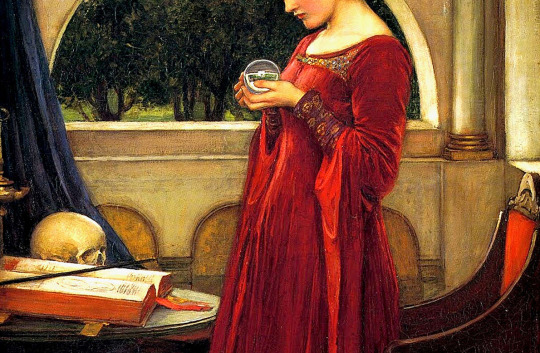
Magic - change wrought through unnatural means
Most fantasy can be placed along a spectrum where there are 3 main points: soft magic at one end, hard magic at the other, and a middle ground between the two.
Soft Magic
Magic that is not well-defined for the reader.
Generally, we don’t understand where the magic comes from, who can use it, or what its limitations are.
Readers can see this type of magic being used.
But they can never anticipate when magic will be used in the plot because they can’t begin to guess how it works.
You can’t break a rule if the rules don’t exist!
Most stories that feature this system will have the magic users be secondary characters, allowing them to avoid explaining exactly how the magic works.
It’s also argued that without knowing everything about the magic, it tends to hold more wonder and excitement for readers.
Hard Magic
Has very rigid boundaries.
Readers know where the magic comes from, how it’s used, who uses it, and what its boundaries and limitations are.
We know the limitations of the characters and can understand why they can’t simply magic themselves out of any particular challenge.
Stories with hard magic systems do not need to avoid the main character being a magic-wielder, as they have the capacity to explain to the reader what is going on.
A lot of writers this system because it gives them very explicit guidelines to follow in their plot and creates some more satisfying pay-offs for readers.
The Middle Ground
The meeting point between the soft and hard systems.
We might understand a bit about the way the magic works, but not all our questions are answered.
While most of the content adheres to rules, these rules aren’t fully explored.
This system relies on the reader’s suspension of disbelief.
The main character can be a magic-wielder or not, and it’s up to the writer to determine when magic will be used in terms of plot.
How to Choose a System
You can and should use these guiding principles to build your magic system. Remember that you don’t have to choose one or the other. Your system can draw from aspects of both. Just stay aware of the weaknesses of the path you choose, and ensure you utilize its strengths.
Use a hard magic system if:
You are going to use magic to solve problems
Your audience is accustomed to the tropes of hard magic
You are okay with jumping through hoops to expand your system
Your magic doesn’t convey a theme
Use a soft magic system if:
You want to convey a theme through magic
You want to create a sense of wonder
You want the ability to expand easily
You want to be accessible to a broader audience
Your magic won’t regularly be used to solve problems
Branches of Magic
Like most writing processes, there isn’t really a correct place to begin designing a magic system. A common, and efficient, place to start, however, is by choosing what type of magic system(s) you wish to employ, such as:
Nature-based magic: water, earth, fire, air, and everything in between
Divination magic: see beyond sight and peer through time and space
Conjuring magic: move objects through space over any distance
Psychic magic: master the world of the mind
Life and death magic: tap into the very forces of life, death, and un-death with this surprisingly versatile collection
Animal- or creature-exclusive magic: some creatures just do it better
Magitech systems: the blurring lines of sorcery and science give magic a next-gen, high-tech flair
Eclectic magic: it doesn’t have to be “real” magic to have a real effect
Uncommon magic systems: the unsung heroes of fantasy magic
AALC Method
How to create your own magic system using the AALC (Appearance, Abilities, Limits & Cost) Method
Appearance
What the magic looks like
Makes the world feel more exotic
Can cause problems for characters but cannot solve them
Usually tied to a character arc
Abilities
What the magic does
Points calculated based on magical effect, range, number of people affected, and duration
Characters have a finite amount of fuel (mana) to use abilities
More powerful abilities require more fuel
The fuel does not have to be overt for the audience to understand
If points not overt, cannot solve conflicts unless a cost system is added
Limits
Unlimited uses of magical abilities
Abilities stratified in codified levels defined by their limits
The more the levels' abilities and limits are known by the audience, the more they can be used to solve conflicts
Focused on clever uses of abilities against stronger foes
Cost system can be added to enhance dramatic moments
Cost
Costs must be greater than or equal to abilities to make them dramatically satisfying
Costs can include time, exhaustion, materials, sanity, morality, etc.
Adds dilemma to magic by forcing characters to make choices
The greater the character's sacrifice, the more audience satisfaction at conflict resolution

Each system builds on the previous ones, so that Cost Systems use all four, while Point Systems only care about Abilities and Appearance.
Multiple systems can exist within the same story, and systems can harden over the course of the story.
The Force, for instance, has been a Soft, Point, Level, and Cost System depending on who wrote it at the time.
SOFT SYSTEMS (Appearance Only)
Window Dressing - magic for secondary characters; can instigate conflict but cannot solve it; e.g., Gandalf
Soft Villain - No explanation or upper limits needed; makes villains more powerful to make heroes greater underdogs; e.g., The Emperor
Chosen One - Unknown power keeps hero safe throughout story; can be considered plot armor unless earned through character arc
Sort Hero Incomplete - Curse or positive ability the character cannot control; hero still learning limits of ability at story's end; powers and arc continued in next adventure
Soft Hero Complete - Hero embraces ability to complete arc and solve main conflict; magic must become harder in subsequent adventures
POINT SYSTEMS (Appearance + Abilities)
Points Opaque - Non-explicit reservoir of energy fuels powers; cannot solve main problems without cost option because characters finding hidden energy reserve feels like deus ex machina
Points Hard - Both abiliites and points system must be explicit like in video games; becomes about resource management; easy to understand but takes sense of wonder out of magic
LEVEL SYSTEMS (Appearance + Abilities + Limits)
Soft Level Static - Unchanging power without upper limits; cannot solve conflicts because feels repetitive; power must be used cleverly; e.g., Wolverine's healing factor
Soft Level Advancing - Increased powers or new powers with unknown limits; cannot solve conflicts unless tied to a character arc like Soft Hero Complete, at which point "unlocks" new abilities
Hard Level Static - Unchanging abilities with clear-cut limits; can solve conflicts so long as setup is properly seeded, usually resulting in sacrifice; e.g., Genie
Hard Level Advancing - Well-established abilities with limits; can solve conflicts based upon clever uses of abilities, usually against stronger foes; e.g., Airbender
COST SYSTEMS (Appearance + Abilities + Limits + Cost)
Static Cost - Well-established cost remains consistent for each use of ability; can solve conflicts since based on personal sacrifice
Cost Fluctuating - Costs change based upon dramatic need; costs must be greater than or equal to ability; possible costs include lost time, money, sanity, health, memory, life, morality, etc.
Sources: 1 2 3 4 5 6 ⚜ Writing Notes ⚜ Writing Resources PDFs Writing Notes: Magic System ⚜ Fictional Items; Poisons ⚜ Fantasy
#writing reference#fantasy#magic system#writeblr#dark academia#spilled ink#fiction#creative writing#novel#writers on tumblr#literature#writing prompt#poets on tumblr#poetry#writing prompts#light academia#lit#writing tips#writing inspiration#writing ideas#john william waterhouse#writing resources
936 notes
·
View notes
Text
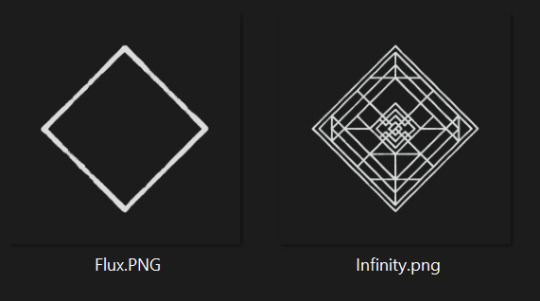






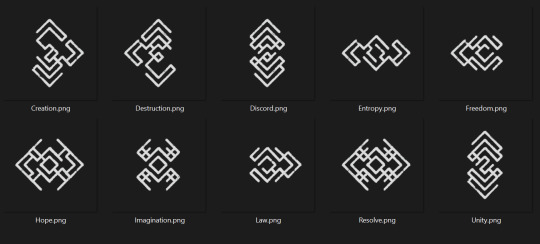
I'm cooking and I'm eating at the same time.
957 notes
·
View notes
Text
Lateral vs Vertical Magic Systems
I… think I’m the only one to use these terms? What I mean by this is different than hard and soft magic, slightly.
Quick recap:
Hard magic systems have rules and strict definition for what can and can’t be done
Soft magic systems go more off vibes, magic exists but the exact mechanics are not important or don’t exist
—
I think you can have a lateral or vertical magic system that’s either hard or soft, and what I mean by this is:
Vertical magic is where everyone has magic of wildly different flavors but hones them all for the same specific purpose.
Lateral magic is where everyone has magic of the same flavor but uses it for wildly different purposes.
Here’s some vertical magic examples:
Percy Jackson: Nobody uses their demigod powers for anything other than staying alive, by and large, and there’s a huge variety of demigod power possibilities and very little overlap. Whether it’s physical combat or mental, these kids’ powers exist so they can fight gods and monsters.
Naruto: I have not seen most of this show so correct me if I’m wrong but, this is a world where ninjitsu is almost exclusively for combat. While there’s core principles, the heaviest hitters in the show all have wild and exclusive powers or special moves that only they can use that go far beyond skill in martial arts (except for Rock Lee).
X-Men: By nature of it being a comic book, the premise of the world is built in heroes versus villains and how they use their powers to beat the snot out of each other. In X-men specifically, mutants are persecuted and can’t use their powers legally, and have little choice beyond using their mutation to stay alive and “do good”.
Lateral magic systems might be something like:
Tinker Bell: You’re a nature fairy, by and large, and everyone gets their power from the same source, pixie dust, each using their flavor of magic to suit their niche purpose in the environment
Danny Phantom: Yes, he’s a superhero and must have fights, but all of Danny’s super-powered rogues are ghosts, with no exceptions, and everyone is limited to how creatively and uniquely they use the same basic ghost principles of possession, telekinesis, invisibility, and intangibility, + their special trait, but all also suffer the same issue that unites them more than once: They are dead, and good or bad, the living fear them.
Fullmetal Alchemist: Alchemy isn’t limitless, and its practitioners typically focus on one very specific kind of alchemy of their choice with the hard rule that everyone must follow of construct, deconstruct, and reconstruct, and get really, really good at honing it mostly for combat, but also in fields of science, engineering, etc. There is alchemy and only alchemy, and it has rules.
—
Last Airbender is both! Its bending rules are strictly limited to the four elements and how creative you can get with your element… but it is also a show that heavily features martial arts and how that bending can be used in combat, but it also built a world where bending factors into other jobs, arts, and the very fabric of society.
Why does lateral vs vertical magic matter?
When you’re designing your magic system, you have to think about how this magic would integrate into a world as if its always existed there. Is it hidden magic, like in most urban fantasy? Or is it baked into the fabric of society, like with bending? Does everyone start with the same basic tools and go wild, or does everyone start wild, and all chase the same aspirations?
Whichever you pick does depend on the story you’re telling. A lot of the media I mentioned is action-adventure, which means that all magic, lateral, vertical, soft, or hard, leans toward one thing in the end: Combat.
But beyond combat, how can your magic be used? Are people allowed to practice it without regulations or is it heavily structured by their fantasy society? If it has always existed, how would their would be fundamentally different than ours?
#writing#writeblr#writing a book#writing advice#writing resources#writing tools#writing tips#fantasy#magic system
423 notes
·
View notes
Text
Questions to ask yourself when creating a magic system
I have more questions for you!!! :D
As there are no real-word examples for this one, I’m going to be talking a lot about my own magic systems, and those of the medias I enjoy! There will be a list of all the things I referenced at the bottom!
What does magic DO
Exactly the title. What does magic do? (Can it make potions? Cast spells? Animate things? Transfigure things? Create things? Kill things? Cast hexes or charms? Multiple of these?)
What does magic have an affect on? What does it not?
How strong is magic? What are its limits? How do these differ from person to person, or place to place?
Does magic do different things for different people?
How does a magic caster’s intention for a ‘spell’ affect it? Is magic entirely reliant on a mental image of what is wanted, or does it need to be casted a certain way to work, like a recipe?
How is magic casted? (Note- I recommend being creative here! It doesn’t have to just be waving a wand. It can be through making pottery, it can be through sewing certain patterns, or dancing a certain dance, etc etc etc)
How can spells be used for something that is not their intended/common purpose? How are new uses of magic discovered? Which uses are most common, and why?
How does societal standards affect the use of magic? Will less people know about more harmful or taboo spells? Will it be less common for, say, a woman to use/be trained in magic?
Source of Magic
Where does magic come from? (Do the gods give access to their most devout followers? Is it handed down in one’s blood? Does it come from the earth?)
Is magic learnt, or are people born with it? (E.g does magic work through potions that can be made by anyone with the right ingredients, or is it only possible if one has magic already in their blood?)
Can someone who logically shouldn’t know magic learn/possess it by alternate means? (E.g. Luz from The Owl House learning magic via ‘glyphs’ despite not being a witch) how would people treat this? (Is it seen as ‘lesser’ or somehow not ‘real’ magic?)
Can magic be harnessed through a wand/staff/etc? Can it only function through this conduit, or can it be done without? How does magic function if it does not have the aforementioned conduit? (Is it harder to manage? Is it more dangerous? Is it simply lesser?)
Another dot-point because the last one was far too long; how is the use of ‘magical aides’ (wands, etc) treated? (Is it seen as something only a child would use? Is it very common? Is not using one seen as dangerous and bad?) How does the function of magical aides affect this? (Note- a very good example of this is the string in A Marvellous Light, which functions via ensuring a magicians cradles [hand movements one does to cast a spell] are more precise. It is only used by those with little magic, so it is looked down upon.)
How would one learn magic? (Is magic taught in schools? Are there books on it?)
Can magic be done/enhanced if multiple people cast it together? How would this be done?
Is magic a separate entity from it’s user? Is it an entity at all? Can it react without instruction/ disobey it’s user? Is it a possession of it’s user? Is this different/ perceived differently for different people?
Can magic be mistreated/ abused? (Note- here I do not mean an ‘abuse of power’ I mean abuse in the way one could abuse a pet) what are the consequences of this? (Might magic stop working, or turn on it’s user?)
Affect on Culture/the greater world
Who has magic? Who does not? Who knows about magic? Who does not? Is it a secret? How is this secret kept? Who enforces that it must be a secret? What is the punishment for letting the secret be known?
Can people have more or less magic? Can people have more or less knowledge on it, or skill with it? Does this cause any power imbalances or issues for either side?
How do the uses of magic impact the way things are done? (E.g. if there is a spell used to dry things, people may not use drying racks.) would the skills of those with more magic be useful in a work setting? (E.g. if some people know the aforementioned drying spell and some do not, might those who do know it work as something close to a washerwoman because of their skill?)
Is magic regulated at all? Who regulates it, what are the regulations, how strict are they, and what are the punishments for breaking them?
Is magic seen as normal? (Keep in mind: if magic is possessed by a majority of people, it very well may be. Because of this, characters may be less likely to be impressed by magic. Think about how this will affect the language surrounding magic, and how people treat it.)
How will different people view or interact with magic? (E.g. a rebellious teen, a businessman and an elderly woman are not going to have the exact same view or uses of magic. Try to explore this!)
How will those with a great deal of magic view those without/ without a great amount, and vice versa? How does this affect the world and it’s prejudices?
Consequences
How can magic hurt a person if misused/overused/ used at all? (Is the damage physical, mental, physiological, all three?) (E.g. my own magic system causes people to actively unmake themselves as they use their magic, leading to sickness, insanity, derealisation, hallucinations, etc etc etc)
Is this damage known? How does the knowledge of it affect the treatment of magic? (Are people terrified of it? Do they not care, and see it as a worthy risk? What might lead someone to push through the damage?)
How does this damage manifest, and how noticeable is it? (E.g. Are there physical scars or other warning signs, or is it entirely unnoticeable until it is too late, like magical rabies?)
Can damage from magic be reversed or healed? How? Can potential damage be avoided? How?
Can one’s magic turn on oneself? How would this happen, and what are the consequences of this?
Can magic be hurt/diminished? How does this affect its users? (E.g. silver and werewolves)
When an attempt at magic fails, how does it fail? Is it like baking, where at worst it’ll ‘taste good, but be a little dry’ or is it like mixing volatile chemicals, where at worst you die?
Appearance
How does magic look? (I highly recommend finding a metaphor or motif for magic, as this really helps flesh out its appearance and makes it easier to describe!!)
Can its appearance look different for different people? Can it change over time?
Does magic manifest itself via means other than visual? (One of my characters has very strong nature magic, and thus he grows flowers when he is happy, and always smells floral)
Does magic have a physical effect on it’s users? (E.g. the dark magic in The Dragon Prince)
Is one able to tell when magic has been cast upon something?
Every piece of media I referenced in this, in order of appearance
The Owl House, a TV show on Disney written by Dana Terrace
A Marvellous Light, a novel written by Freya Marske (this series is a wonderful example of how to make a magic system. It is very well thought out, and the varied experiences and views of magic for each magician character is so, so good. 10/10. If you want a good example of magic please read this!!! (Granted I might be a little biased because I just love this book series))
The dragon prince, a TV show on Netflix
222 notes
·
View notes
Text
I present the wheel of magic worldbuilding headcanons.
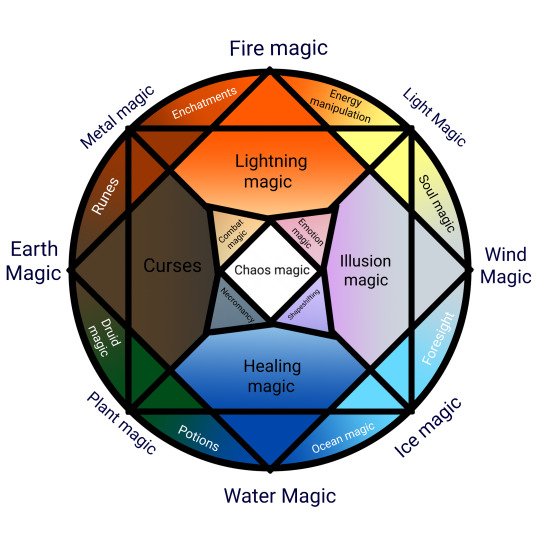
161 notes
·
View notes
Text
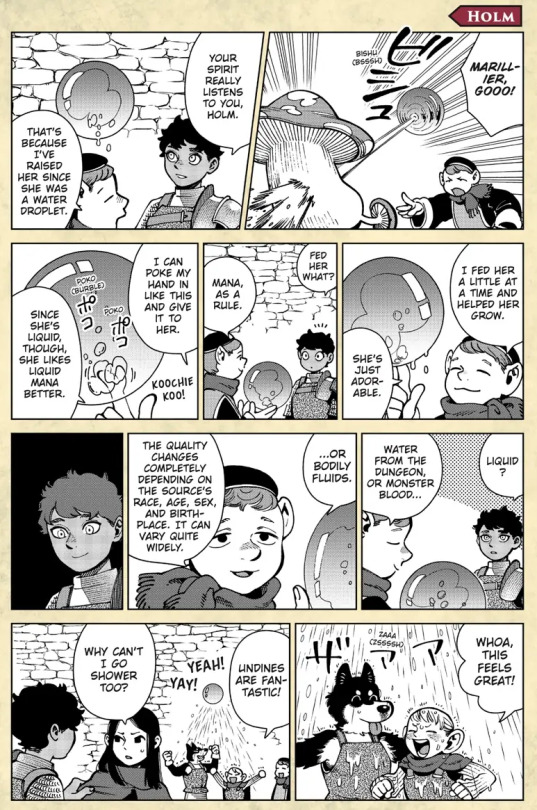
Dungeon Meshi - Holm's undine, Marillier
#Dungeon Meshi#Undine#Magic System#Dunmeshi extra#Adventurers Bible#Holm Kranom#Holm#Holm dungeon meshi#Kabrus party#Kabru#Familiar#Marillier
5K notes
·
View notes
Text
More reasons why the characters cannot fix everything with magic
• Children all have access to magic, but as they get older, their powers fade away.
• Mastering even the most basic spell takes years of training.
• “We killed the gods. Turns out that doing that destroyed magic.”
• The amount and strength of magic is inversely proportional to the level of industrialization.
• Characters don’t know what kind of magic they have and must embark on a long and arduous journey in order to find out what they can do.
• “We can use magic, but only on the microscopic scale.”
• The reason why magic doesn’t work is that no one believes in it anymore.
• To cast a spell, one must play the correct tune on a specific instrument.
• Only maker of staffs, rods, and wands has a 10,000 year long waiting list.
• Magic comes from the stars…and it can go no faster than the speed of light.
• The power of magic waxes and wanes. Right now is the part of the cycle where magic is at its weakest.
• People once had a symbiotic relationship with organisms that gave them the power of magic. The organism has been extinct for centuries.
• As the use of magic has a destabilizing effect on the universe, a secret society exists with the sole purpose of killing all magic users before they destroy the universe (some of whom have deliberately attempted to cause an apocalypse).
• “You must sacrifice a part of you in order to use magic. It could be a part of your body, it could also be your identity, or even your very soul.”
#writing#creative writing#writing resources#writing inspiration#writing prompts#writing reference#magic system#writer#writers#writing community#writer on tumblr#writeblr
845 notes
·
View notes